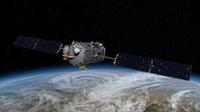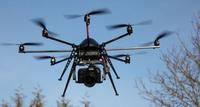-
NASA's new carbon-counting instrument ready for lift-off

Carbon dioxide is the most significant human-produced greenhouse gas and the principal human-produced driver of climate change; new NASA spacecraft will uniformly sample the atmosphere above Earth’s land and ocean, collecting more than half a million measurements of carbon dioxide concentration over Earth’s sunlit hemisphere every day for at least two years
-
-
An 8th grader from Indiana, Massachusetts school team, win 2012 math competition
An 8th grader from Sycamore School Carmel, Indiana won the 2012 Raytheon MATHCOUNTS National Competition; he competed against more than 200 other middle school students in the prestigious academic event; the best and brightest middle school mathematics students engaged in a multi-day competition which included a written exam and culminated in the lightning speed Countdown Round; in the team competition, Massachusetts captured the title of National Team Champion
-
-
An 8th grader from Indiana, Massachusetts school team, win 2012 math competition
An 8th grader from Sycamore School Carmel, Indiana won the 2012 Raytheon MATHCOUNTS National Competition; he competed against more than 200 other middle school students in the prestigious academic event; the best and brightest middle school mathematics students engaged in a multi-day competition which included a written exam and culminated in the lightning speed Countdown Round; in the team competition, Massachusetts captured the title of National Team Champion
-
-
New explosives detection based on micro- and nano-cantilever beam sensors
A team of engineers is investigating micro- and nano-cantilever beam sensors for explosives detection; micro- and nano-cantilever beam sensors offer a distinct advantage in that they are small, very responsive, and very sensitive; their sensitivity and selectivity can also be tuned by modifying the surface treatment
-
-
U.K. robotics R&D receives major boost
U.K. research to develop smart machines that think for themselves received a £16 million boost yesterday thanks to a major partnership between the government and industry. This research includes safe ways of monitoring in dangerous environments such as deep sea installations and nuclear power plants, “nursebots” that assist patients in hospitals, and aerial vehicles that can monitor national borders or detect pollution
-
-
Mass spectrometry for detection of trace quantities of explosives
The detection of trace quantities of explosives is critical to defending civilian populations from terrorist attacks; researchers have developed a method of modifying a commercial electrospray ionization source for ambient detection of explosives on surfaces
-
-
Teaching robots to pick up oddly shaped objects
The use of robots in military and first response missions is growing; in some of these missions – for example, checking a suspicious object, lifting an oddly sahped IED off the floor — robots need more flexibility and dexterity than is currently available; researchers offer encouraging news on this front
-
-
The American West running low on water
The American West has a drinking problem; on farms and in cities, people who live in that region are guzzling water at an alarming rate; scientists say that to live sustainably, they should use no more than 40 percent of the water from the Colorado River Basin; currently, however, they use 76 percent, nearly double the sustainable benchmark
-
-
Little of Earth’s water is usable in everyday life
Very little of Earth’s water is usable in everyday life; about 96 percent of water on Earth is saline; of the total freshwater, over 68 percent is locked up in ice and glaciers; another 30 percent of freshwater is in the ground; rivers are the source of most of the fresh surface water people use, but they only constitute about 300 mi3 (1,250 km3), about 1/10,000th of one percent of total water
-
-
Panetta: Environment is becoming a national security concern
Climate and environmental change are emerging as national security threats that weigh heavily in the Pentagon’s new strategy; the secretary also said he has great concern about energy-related threats to homeland security that are not driven by climate change
-
-
Flying robots equipped with 3D gear: better surveillance on the cheap

Whether deployed to create virtual maps of difficult-to-access areas, monitor construction sites, measure contamination at nuclear power plants, assess conditions in a disaster-ravaged area, or identify rowdy soccer hooligans, mini UAVs could be used in a wide range of applications, obviating the need for expensive aerial photography or satellite imaging
-
-
Using nanomaterials to build safer, longer-lasting roadways
Asphalt is now made from petroleum, so it is very expensive; researchers tested two types of nanoclays, adding 2-4 percent by weight to asphalt; this is a smidgeon — less than half of a percent of the total weight of the asphalt pavement itself, but it made a big difference, and could make for safer, longer-lasting roadways
-
-
Novel radiation detection technology to thwart nuclear terrorism
Researchers at the Georgia Tech Research Institute (GTRI) are developing ways to enhance the radiation-detection devices used at ports, border crossings, airports, and elsewhere; the aim is to create technologies that will increase the effectiveness and reliability of detectors in the field, while also reducing cost
-
-
New DNA-based chemical sensor acts as an all-electronic nose
Chemical sensors are very good at detecting a single substance or a class of chemicals, even at highly rarified concentrations; biological noses, however, are vastly more versatile and capable of discriminating subtle cues that would confound their engineered counterparts; even highly trained noses, however, do leave a certain ambiguity when relaying a signal
-
-
Counterterrorism expert: democracy in Central Asia lost in translation
Democracy in post-Soviet Central Asia states failed not only because of the region’s Soviet legacy and hardships of transition, but also due to a lack of cultural competence among international, U.S., and EU agencies promoting democracy
-
More headlines
The long view
Encryption Breakthrough Lays Groundwork for Privacy-Preserving AI Models
In an era where data privacy concerns loom large, a new approach in artificial intelligence (AI) could reshape how sensitive information is processed. New AI framework enables secure neural network computation without sacrificing accuracy.
AI-Controlled Fighter Jets May Be Closer Than We Think — and Would Change the Face of Warfare
Could we be on the verge of an era where fighter jets take flight without pilots – and are controlled by artificial intelligence (AI)? US R Adm Michael Donnelly recently said that an upcoming combat jet could be the navy’s last one with a pilot in the cockpit.
The Potential Impact of Seabed Mining on Critical Mineral Supply Chains and Global Geopolitics
The potential emergence of a seabed mining industry has important ramifications for the diversification of critical mineral supply chains, revenues for developing nations with substantial terrestrial mining sectors, and global geopolitics.
AI and the Future of the U.S. Electric Grid
Despite its age, the U.S. electric grid remains one of the great workhorses of modern life. Whether it can maintain that performance over the next few years may determine how well the U.S. competes in an AI-driven world.
Using Liquid Air for Grid-Scale Energy Storage
New research finds liquid air energy storage could be the lowest-cost option for ensuring a continuous power supply on a future grid dominated by carbon-free but intermittent sources of electricity.
Enhanced Geothermal Systems: A Promising Source of Round-the-Clock Energy
With its capacity to provide 24/7 power, many are warming up to the prospect of geothermal energy. Scientists are currently working to advance human-made reservoirs in Earth’s deep subsurface to stimulate the activity that exists within natural geothermal systems.
